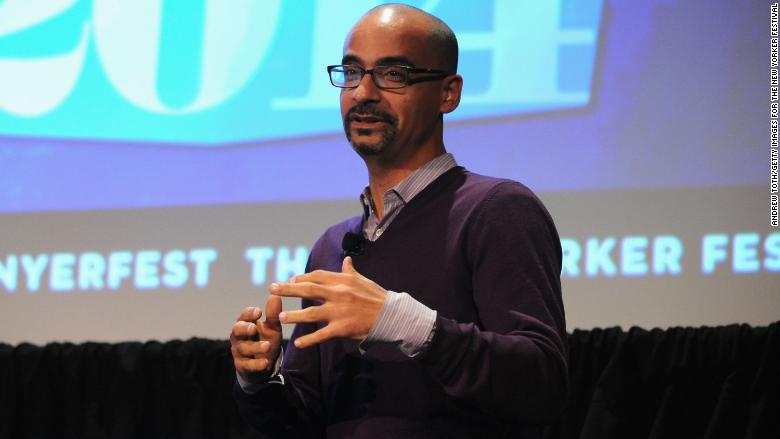
The literary world is facing difficult questions about how it will move forward in the age of #MeToo after allegations of misconduct and verbal abuse were made against a Pulitzer Prize-winning author.
The accusations against Junot Díaz, who won the 2008 Pulitzer Prize for fiction for his novel "The Brief Wondrous Life of Oscar Wao," were detailed during an exchange at a writers' event and in statements made on social media by multiple female authors, weeks after Díaz published a hailed essay about the repeated instances of sexual assault he endured as a child and the decades he's spent dealing with the emotional aftermath.
While CNN has been unable to verify the accusers' claims, those in the literary community -- from authors to booksellers -- have spent the days since the allegations surfaced on Friday facing questions adjacent to those tackled by the entertainment industry when a string of sexual harassment and misconduct allegations were made against several prominent figures late last year, particularly whether or not to stand by the accused.
Two booksellers -- Westbrook, Maine-based Quill Books & Beverage and Duende District, a pop up bookstore in Washington D.C. -- have removed Díaz's books from its shelves.
"Now, I don't know how fans of this work proceed from here. I do know we need to have a more vigorous conversation than simply saying, 'Junot Díaz is cancelled,' because that does not cancel misogyny or how the literary community protects powerful men at the expense of women," author Roxane Gay wrote on Twitter.

The allegations
Attendees told The New York Times that, during a panel at the Sydney Writers' Festival on Friday, the writer Zinzi Clemmons stood up in the audience to ask Díaz about an incident six years ago, when, she says, Díaz mistreated her.
"As a grad student, I invited Junot Díaz to speak to a workshop on issues of representation in literature," she later wrote on Twitter. "I was an unknown wide-eyed 26-year-old, and he used it as an opportunity to corner and forcibly kiss me. I'm far from the only one he's done this to, I refuse to be silent anymore."
"I told several people this story at the time, I have emails he sent me afterward," she wrote. "This happened and I have receipts."
A representative for Clemmons did not respond to CNN's request for comment on this story.
Díaz later withdrew from the festival, according to organizers who cited the allegations by Clemmons and others.
National Book Award finalist Carmen Maria Machado claims Díaz berated her at a separate book event "when I made the mistake of asking him a question about his protagonist's unhealthy, pathological relationship with women," she wrote on Twitter.
"He went off for me for twenty minutes."
When contacted by CNN, a representative for Machado declined further comment.
Author Monica Byrne wrote on Twitter that Díaz demonstrated behavior that was "completely bizarre, disproportionate, and violent" toward her when she disagreed with him at a 2014 dinner with other authors.
When reached by CNN via email, Byrne pointed to a Facebook post she wrote in which she describes her experience with Díaz in more detail.
"Díaz didn't physically assault me," she wrote. "But shouting the word "rape" in my face is absolutely verbal sexual assault."
In a statement made through his literary agent, Díaz said, "I take responsibility for my past," without addressing any allegation specifically.
"That is the reason I made the decision to tell the truth of my rape and its damaging aftermath," his statement said. "This conversation is important and must continue. I am listening to and learning from women's stories in this essential and overdue cultural movement. We must continue to teach all men about consent and boundaries."
In April, The New Yorker published Díaz's essay, "The Silence: The Legacy of Childhood Trauma," in which the author wrote for the first time about being raped as a child.
In the article, Díaz chronicles his experience and the years of silence, mental health issues and infidelity that followed.
A larger conversation
The allegations against Díaz have sparked discussion about sexism in the literary community and calls for support of women writers, particularly women of color.
"Was pretty hurtful to learn that the room applauded Díaz after I left," Clemmons later wrote on Twitter. "I was crying in the lobby while you were clapping for him. Hopefully next time you will think twice about siding with a powerful man over a scared young woman."
Literary institutions and festivals have and will continue to face scrutiny over their reactions to scandals.
The Swedish Academy, which is responsible for awarding the Nobel Prize in Literature, postponed the giving of the prestigious prize last week in the wake of allegations made against someone with close ties to the group.
The academy, one of Sweden's most respected institutions, decided instead to announce this year's literature laureate in 2019.
"We find it necessary to commit time to recovering public confidence in the academy before the next laureate can be announced," Anders Olsson, the academy's permanent secretary, said in a statement.
The Sydney Writers' Festival said Saturday it remains committed to a "supportive and safe environment for our authors and audiences alike" and referenced a line from Díaz's essay for the New Yorker.
"Mr. Díaz wrote, 'Eventually the past finds you.' As for so many in positions of power, the moment to reckon with the consequences of past behaviour has arrived."


